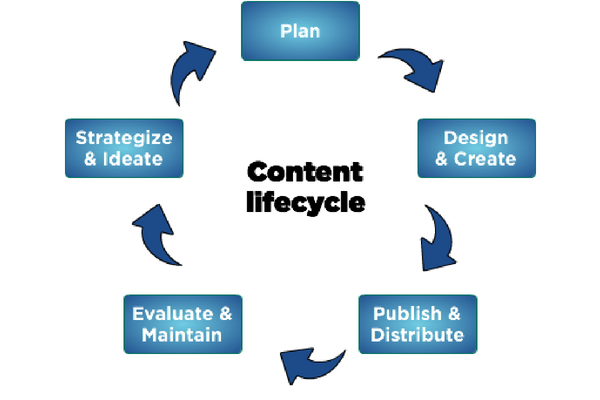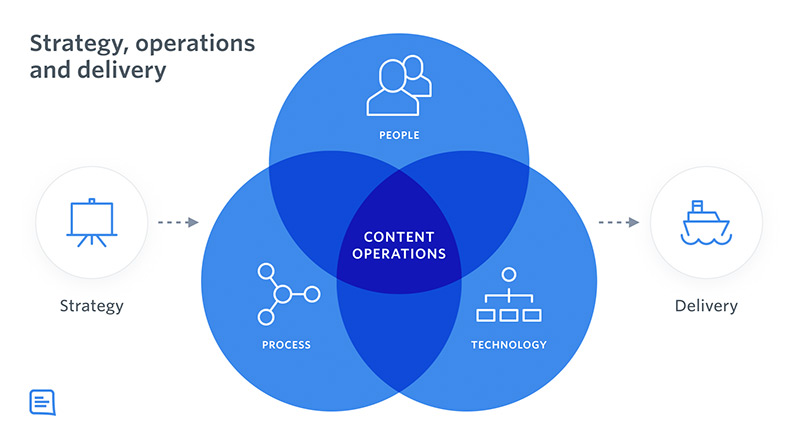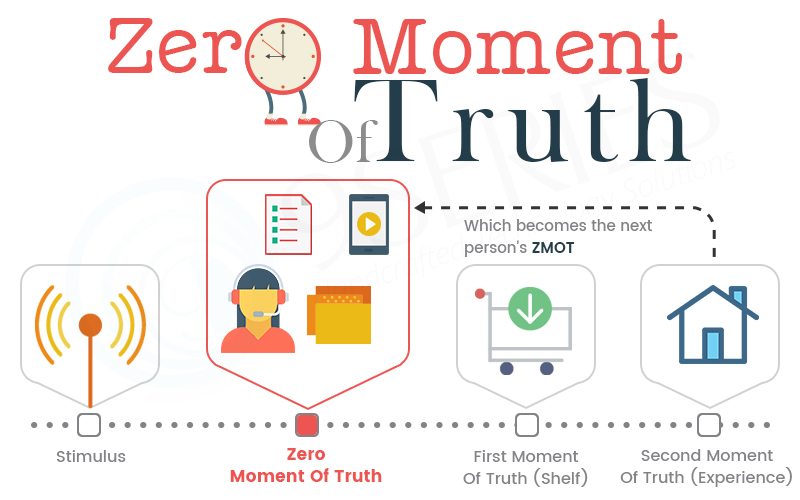Basic of Content Operations and Its Evolution

If your company publishes any kind of content, it has some sort of content operations. Though deeply connected, content marketing and content operations are not exactly the same. While content marketing focuses on creating quality content that helps a company reach new leads and build a long-lasting connection with existing consumers, content operations is the process of getting this task done.
It is an effective mix of people, processes, and technology in a company that helps achieve all your content marketing objectives, including maintaining your content lifecycle from start to finish.
In this article, we will learn a bit about content operations, content marketing, and the evolution of ContentOps.
All About the Content Lifecycle

Every blog or social media post you create is a part of a complex ecosystem of stakeholders, audiences, demands, and objectives that may benefit your organization in various ways. Content is an asset for any organization. You will win half the battle if you learn to manage content well.
Valuable and engaging content is great for an audience. No wonder experts recommend that one gets into the content process’s nitty gritty. The content creation process is a framework of steps to producing content. It involves researching, planning, writing, and publishing your content. Recently, content has taken the spotlight and is not just a product anymore. Content and its creation transforms and evolves through different stages called a ‘lifecycle’ from inception to creation, publication, and maintenance. Understanding the content lifecycle is essential whether you are a giant media corporation or an independent online shop.
The most important stages of the content lifecycle:
- Strategy and Planning
- Production and Creation
- Publication and Maintenance
- Preservation and Repurposing
When businesses use appropriate technology, their content lifecycles can easily manage and optimize, allowing their marketing teams and content creators to focus on creative ideas. A well-defined content lifecycle means reaping the best out of each piece of content and then recycling it as a brand new one!
What are Content Operations?

With an operations strategy, businesses have the edge over their competitors. Doing a website redesign every few years was thought to solve the problems associated with maintaining content and communicating with our audiences. Realizing the limits of these endeavors, the emphasis has shifted to the significance of everyday operations. Content operations ensure that the purpose of the material you generate extends beyond your marketing objectives.
A single piece of content today has enormous potential since it has the ability to fulfill a wide range of purposes in today’s connected world. These purposes include grabbing the attention of online audiences, improving SEO, enabling customer assistance, raising the user experience, and helping in internal communications. A well-optimized content process and a high-quality content operations framework can identify and manage these components, allowing you to build effective content with more traction.
Regarding content ops, it will be beneficial to build an operations strategy, manage logistics, review content strategy, optimize people, process, and technology, create a structure for content generation, and work on generating effective content, delivery, and analysis using the available resources.
Your organization will benefit from successful content operations, often known as ‘ContentOps,’ since it will have a more efficient and reusable method for generating high-quality content.
How Do Content Operations Help Your Business?
Organizing strategies around these essential functions can make a complicated operation seem extremely simple. Putting the right people and tools in the correct mix will create a comprehensive strategy for your entire content operation.
The key to making it big is managing content well and dealing with stakeholders to ensure that each campaign meets as many needs as feasible for your business. As a result, you may need to broaden the scope of your planning process to include topics previously within the content team’s exclusive jurisdiction.
The following are some of the most vital aspects of how content operations can benefit any business:
- Determining strategic company objectives, selecting target audiences, and developing a messaging strategy.
- Distribution; reaching your audience and effectively conveying the information to them.
- Maintaining your supply chain will ensure that you have the appropriate communications assets when you need them.
- Learning management, data management, and output optimization are part of the insight process.
- Focus on a winning content strategy. Great content can transform how your business is perceived.
Timeline of How Content Operations Have Evolved

The evolution of content marketing paved the way to a bright future in the content market. Significant research by Google in 2011 was the Zero Moment of Truth.
It revealed that 88% of customers employ a Zero Moment of Truth – a point in the purchase cycle when consumers study products before buying them. Google’s study also showed that word of mouth influenced that time.
The research offers a unique perspective on the growth of content marketing. It sums up how and why firms needed to concentrate on content marketing in the early 2010s.
It was proof that their stories were shared online well beyond the marketing teams’ control, and it was in their best interest to influence those dialogues.
The ZMOT research emphasized good SEO. Now, ranking for relevant terms on search engines has become critical to a company’s online presence and customer trust.
However, it wasn’t Google’s only early-2010s surprise. Google’s search ranking algorithm altered around the time of the research to avoid ‘keyword stuffing’ – the practice of repeatedly loading a site with specific keywords to manipulate search engine ranks.
The update reflected Google’s ongoing commitment to providing excellent online experiences for people. The move was well-received and allowed firms to concentrate on creating more meaningful content.
With the constant growth of the web, content marketing’s development wasn’t just driven by SEO. The sudden emergence of social media — one of the most disruptive phenomena in human history — also impacted the discipline. These channels’ mainstreaming posed new problems for content marketers.
Social media developed a distinct way of consuming material than search engines. The distinction was ‘pointed vs. passive’.
While using a search engine, you’re seeking information. With social media, users passively consume material on their favorite platforms. Facebook comes to you.
This tendency encouraged the production of more shareable, attention-grabbing material for social media.
By 2021, over 80% of marketers utilized social media, compared to just 40% using content marketing and SEO.
Videos became a popular content marketing channel throughout the decade, especially among younger customers.
By 2021, almost 70% of marketers expect video to be their main content medium. Also, approximately 90% of respondents want to watch more brand videos.
Videos are simpler to follow than blog posts, emails, or ebooks. Throughout the 2010s, viewers became increasingly used to it. Videos are looked at as effective content by content creators across spectrums.
By the decade’s end, YouTube had become a major player in content creation and marketing. Content marketing changed significantly in the 2010s, but it isn’t static and never will be. There will always be further adjustments.
Key Takeaways
- Content operations are the combination of procedures, people processes, and technology required to plan, create, manage, and analyze all kinds of content across all channels.
- Content marketing operations are increasing as firms seek to improve marketing efficiency and effectiveness.
- With origins in the 1920s, marketing operations have evolved through several marketing disciplines, revealing its relevance, advantages, and rising popularity.
- Content marketing operations improve marketing efficiency and performance. It includes everything from strategy and budgeting to implementation and analysis. Conclusion
Over the past several years, the science of marketing and the digital technologies enabling its operations have expanded exponentially. The operational complexity of day-to-day tasks has risen as a result.
Marketing operations are scrutinized in the same way that other aspects of the company are, that is, to optimize efficiency, streamline processes, execute at faster speeds, and demonstrate value to the organization. It is the job to serve and assist each of these stakeholders and their objectives in several ways.
FAQs
The collection of procedures, people, and technology required for strategically planning, developing, managing, and evaluating all content types throughout an organization is known as content operations. It is essentially a foundation for developing the content that drives its customer experiences.
The content operations ecosystem includes every aspect of the company that makes, consumes, or shares content—which, let’s face it, is practically all of the business. A content operations platform enables a brand to base its operational model across departments, agencies, and channels on a single set of capabilities.
Since its inception in the 1700s, content production has come a long way, but it is still changing today.
Digital operations are the notion of injecting agility, intelligence, and automation into company processes to build operational models that delight consumers and increase performance.
Content is transitioning from something that companies push to consumers to a tool that brands use to encourage customers to generate content for them. With more options in the market than ever before, it will be intriguing to see how content marketing evolves in the future.
Latest Blogs
Learn how to rank on AI search engines like ChatGPT, Perplexity, and Gemini by optimizing your content for authority, structure, and relevance. Stay ahead in AI-driven search with this strategic guide.
Explore the best healthcare SEO services for your medical practice. Improve online visibility and effectively reach more patients in need of your services.
Discover top social media agencies specializing in banking solutions, enhancing financial services and driving engagement.
Get your hands on the latest news!
Similar Posts

Content Operations
7 mins read
Mastering Content Distribution Tactics: A Comprehensive Guide

Content Operations
4 mins read
Streamlining Your Process: The Importance of Content Workflow Management

Content Operations
6 mins read